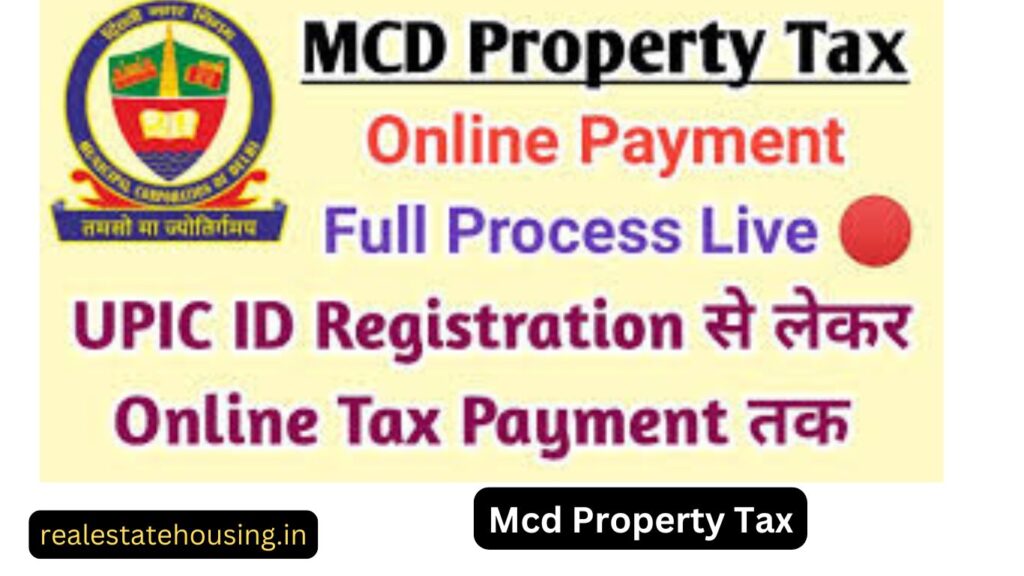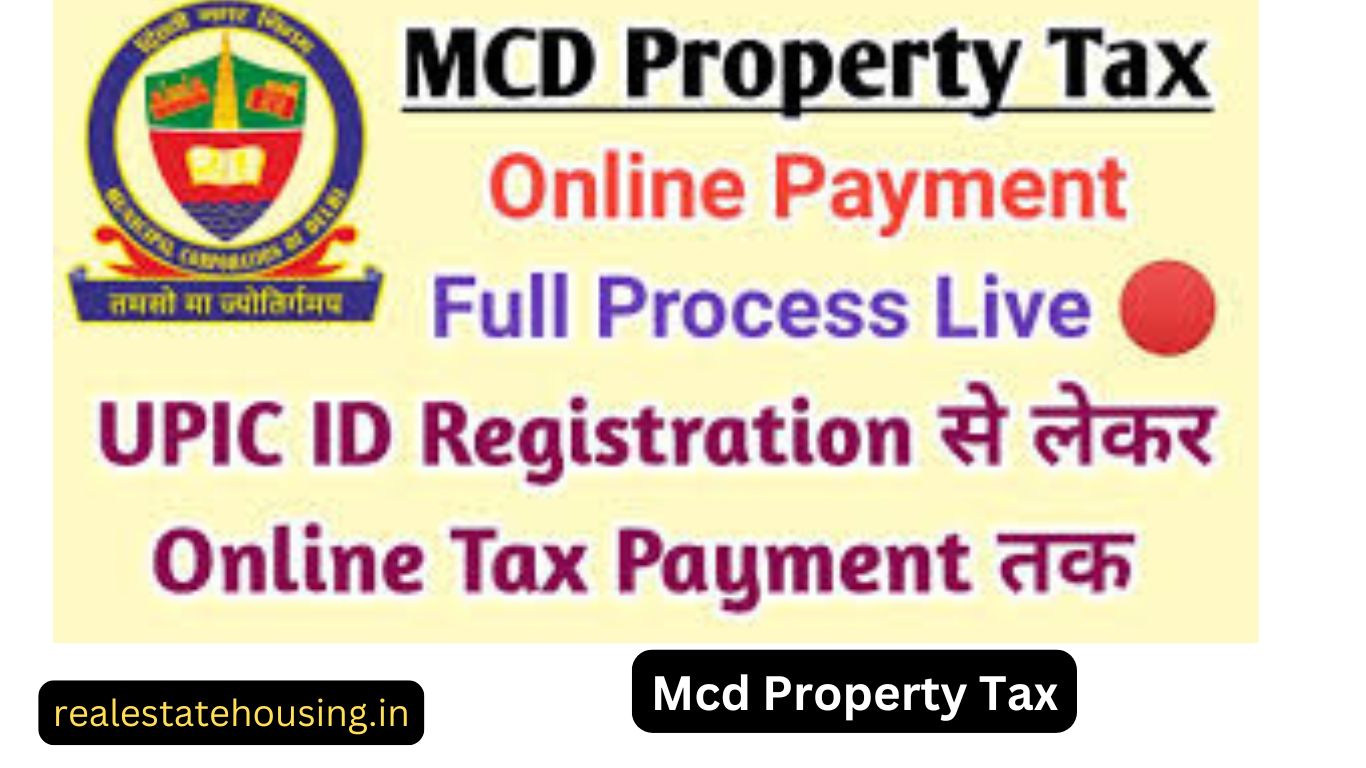Mcd Property Tax Understanding MCD Property Tax: A Comprehensive Guide
Introduction

The Municipal Corporation of Delhi (MCD) property tax is a significant responsibility for property owners in Delhi. Understanding its nuances is crucial to ensuring timely compliance and avoiding penalties. This guide delves into the key aspects of MCD property tax, including its calculation, payment process, exemptions, and penalties.
What is MCD Property Tax?
Property tax is a levy imposed by the Municipal Corporation of Delhi on property owners. The revenue collected is used for infrastructure development, sanitation, maintenance, and other civic services in the city.
Who Needs to Pay MCD Property Tax?
All property owners in Delhi, including residential, commercial, and vacant landowners, are required to pay property tax to the MCD. This applies to individuals, companies, and organizations owning properties within the MCD’s jurisdiction.
Types of Properties Taxed
Residential Properties: Apartments, independent houses, and housing societies.
Commercial Properties: Shops, office spaces, and factories.
Vacant Lands: Land parcels not yet developed.
Mixed-Use Properties: Properties used for both residential and commercial purposes.
How is MCD Property Tax Calculated?
The calculation of MCD property tax is based on the ‘Unit Area System’ (UAS). Here’s how it works:
Unit Area Value (UAV): MCD assigns a specific value per square meter to different localities based on the property’s location and usage.
Built-Up Area: The total constructed area of the property.
Age Factor: Older properties may have lower tax rates.
Use Factor: Properties used for commercial purposes attract higher taxes compared to residential properties.
Occupancy Factor: Self-occupied properties may have lower tax rates than rented properties.
Formula:
Property Tax = UAV × Built-Up Area × Use Factor × Age Factor × Occupancy Factor
Steps to Pay MCD Property Tax Online
MCD offers a seamless online platform for paying property tax. Follow these steps:
Visit the Official MCD Website:
North Delhi Municipal Corporation (NDMC)
South Delhi Municipal Corporation (SDMC)
East Delhi Municipal Corporation (EDMC)
Locate the Property Tax Section: Click on the ‘Property Tax’ tab.
Enter Property Details: Input the property ID or other details to fetch records.
Verify Details: Cross-check the details displayed, such as property type, area, and tax amount.
Make Payment: Use net banking, credit/debit card, or UPI to complete the transaction.
Download Receipt: Save the payment receipt for future reference.
Offline Payment Methods
For those preferring offline methods, property tax can be paid at designated MCD offices. Ensure to carry necessary documents, such as the previous year’s tax receipts and property details.
Exemptions and Rebates
MCD offers several exemptions and rebates to encourage timely payments and support certain groups:
Senior Citizens: Concessions for senior property owners.
Women Owners: Discounts for properties owned solely by women.
Ex-Servicemen and Disabled Persons: Special exemptions for specific categories.
Early Payment Rebate: Discounts for paying the tax before the due date.
Penalties for Non-Payment
Failure to pay MCD property tax on time can result in:
Interest Penalty: Late payments attract an interest rate of 1% per month.
Legal Action: Persistent non-payment may lead to legal proceedings.
Property Seizure: In extreme cases, the MCD can seal or auction the property.
Documents Required for MCD Property Tax Payment
Previous year’s tax receipts.
Property ownership documents.
Occupancy certificate (if applicable).
Property ID issued by MCD.
Key Dates to Remember
Assessment Year Start: April 1st.
First Installment Deadline: June 30th.
Second Installment Deadline: December 31st.
Common Issues and Solutions
Property ID Not Found: Ensure accurate entry or contact the MCD helpline.
Discrepancy in Tax Amount: Raise a query through the online portal or visit the nearest MCD office.
Technical Glitches: Use an alternative browser or device to access the online portal.
Benefits of Paying MCD Property Tax
Legal Compliance: Avoid penalties and legal hassles.
Civic Development: Contribute to better roads, sanitation, and infrastructure.
Loan Eligibility: Up-to-date tax payments enhance property valuation for loans.
Ownership Clarity: Payment receipts serve as proof of property ownership.
Tips for Property Tax Management
Set Reminders: Ensure timely payments with calendar reminders.
Maintain Records: Keep all receipts and documents organized.
Seek Professional Help: Consult tax experts for complex cases.
Verify Details Regularly: Check for updates or changes in the tax structure.
Conclusion
Paying your MCD property tax on time is not just a legal obligation but a civic duty. It ensures the smooth functioning of essential services and the overall development of Delhi. With the comprehensive online and offline options available, compliance has never been easier. Stay informed, pay on time, and contribute to a better tomorrow for the city.
FAQs
- Can I pay MCD property tax in installments?
Yes, you can pay in two installments, typically by June 30th and December 31st. - What happens if I overpay my property tax?
Excess payments are adjusted in subsequent years or refunded upon request. - How do I update my property details with MCD?
You can update property details via the online portal or by visiting the MCD office with relevant documents. - Are property tax rates the same across Delhi?
No, tax rates vary based on the property’s location, type, and usage. - How can I check my MCD property tax dues?
Visit the MCD website, enter your property ID, and view the dues.
By understanding and following this guide, you can ensure hassle-free compliance with MCD property tax regulations and avoid unnecessary complications.

